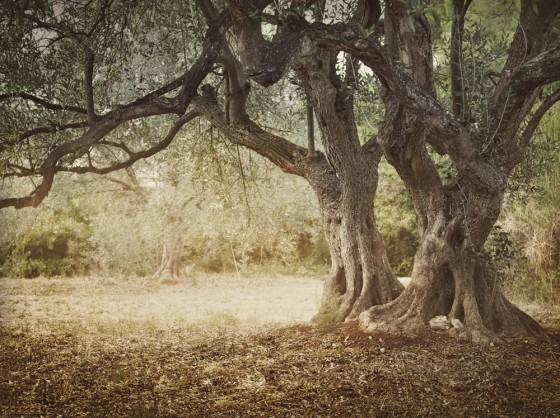 A new research paper traces the roots of the wild olive to one location.
A new research paper traces the roots of the wild olive to one location.
Olives, staple of Mediterranean cuisine, have dubious origins. Called the “tree of life” for the sustenance it provides and its myriad non-food uses (read our list of 10 weird and wonderful ways to use olive oil), the domesticated olive tree is central to Greek, Roman and early Christian mythology. Today, Spain is the world’s top producer, but where did it all begin? Wild olive trees (oleasters) have been harvested since 10,000 BC, and crop domestication was believed to have started in the Near East (ancient Palestine, now modern Jordan) about 6,000 years ago. Using genetics, fossil records and climate modeling, an international team of experts have determined that the olive tree’s roots lie in one place:
the geo-cultural land know as Kurdistan.
“We conclude that the western Mediterranean was not a major primary center of domestication,” the team wrote in the journal Proceedings of the Royal Society B: Biological Sciences. “The cradle of primary domestication of the olive tree is located in the northeastern Levant.”
This refers to the modern-day Kurdish zone between Syria and Turkey, study co-author Guillaume Besnard of the French National Center for Scientific Research told AFP.
From there, the domesticated olive likely spread in a counter-clockwise manner to the eastern Mediterranean and Cyprus, westwards to Turkey, Greece, Italy and Spain “in parallel to the expansion of civilizations and human exchanges in this part of the world”, said the report.
The team sampled DNA data from 534 cultivate olive types and 1263 oleasters from 108 locations, as well as 49 trees from a sub-Saharan species. The researchers concluded that the three main branches of wild oleic split from a common ancestor at least 1.5 million years ago, said Besnard.
“The importance of the cultivated olive tree in peoples’ lives has turned this species into a symbol of ancient, sacred literature. The origins of this crop are often subject to controversies,” the paper said. “I don’t think anybody will dispute that anymore,” said Besnard, according to The Jordan Times.
The man may know olives, but not disparate nations of the Middle East, where ownership of this wonder crop will never be agreed.
Image of ancient olive tree from Shutterstock




Oy, Boris, this argument is wearying.
There was no such thing as “Los Angeles” 6,000 years ago either, but the prehistoric people pulled out of the La Brea Tar Pits would sure argue there was a “place” there, even if it had yet to be called Hollywood.
Conventional terms describe geographic regions (e.g., North America, Rhone Valley, Palestine); new-ish names for ancient lands.
This post is about researchers tracking the history of a fantastic fruit, not about politics nor etymology. Does it really warrant snarky comment?
There was no such thing as “Palestine” 6000 years ago. Changes are Olive trees preceded great state of Israel by few hundred years in this area. Learn some history before blogging.
Boris, maybe it wasn’t called Palestine then, but it is called the State of Palestine now. And yes, it was created by the same world body, United Natios, that created the state of Israel.
Anyhow, your comment really is besides the point and has no relevancy to this article.